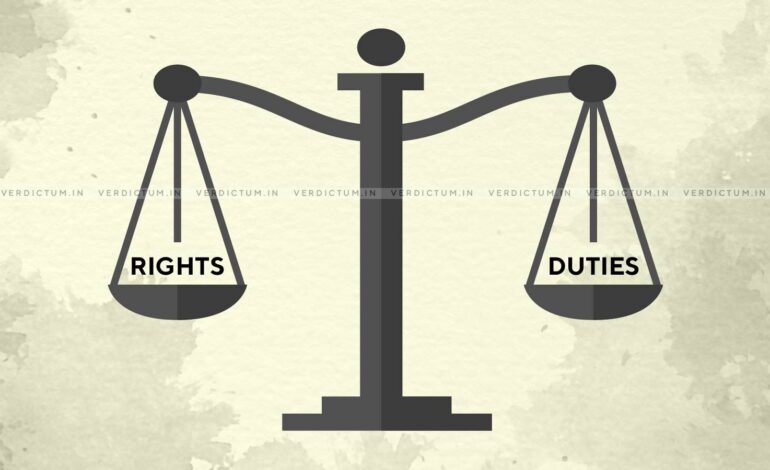
As a global society, we often find ourselves engaged in a vigorous discussion about our rights. We lobby for them, advocate for them, and even protest for their recognition and protection. What we frequently overlook, however, is the equally significant part of this equation—duties. Rights and duties are two sides of the same coin, inseparably intertwined in the fabric of society. They complement each other, serving as the cornerstone of civil harmony and social justice.
The word “duty” comes from the Old French word “devoir” which means “to owe” or “to be obliged to do something.” It implies that one has a moral obligation to perform certain acts or refrain from doing certain things because they are socially acceptable behavior or practices. For instance: if you have a duty to report an accident you witness on the road; if you have a duty to pay taxes; if you have a duty to fulfill your commitments; and so on…
Duties are not only meant to guide us towards making right decisions but also help us shape our character by instilling discipline and self-control in us. In addition, they serve as an instrument through which we can learn how best to handle difficult situations successfully
As you can see, the topic of rights and duties is a complex one that has been debated by philosophers and thinkers for centuries. In this essay, I will attempt to shed some light on this topic by providing an overview of its history, examining its various aspects from multiple perspectives, and discussing some applications in modern society.
The prominent philosopher Immanuel Kant once said, “Act only according to that maxim whereby you can at the same time will that it should become a universal law.” This quote from the father of deontology underscores the importance of duty, reminding us that it is our moral responsibility to act in a manner that we would expect others to act.
Before delving into the intricate relationship between rights and duties, it is crucial to define these terms. A right is a moral or legal entitlement to have or do something. It is the freedom that allows us to express ourselves, to work, to live with dignity, and to pursue our dreams. Conversely, a duty represents a moral or legal obligation, a commitment to act or behave in a certain way that aligns with societal values and norms.
The Relationship Between The Two
The relationship between rights and duties is akin to the ecological concept of symbiosis, where two different entities live together, each benefiting the other. Just as a bee and a flower coexist in a mutually beneficial relationship, so do rights and duties. A right to live with dignity, for example, corresponds to a duty to respect the dignity of others. The right to freedom of expression is balanced by the duty to refrain from hate speech or libel.
Taking a global view, the Universal Declaration of Human Rights, adopted by the United Nations General Assembly in 1948, outlines a series of rights inherent to all human beings, irrespective of race, religion, or nationality. However, it is less well known that this seminal document also underscores the importance of duties. Article 29 states, “Everyone has duties to the community in which alone the free and full development of his personality is possible.” Thus, our global charter of rights also acknowledges the essential role of duties.
However, the importance of duties is often overshadowed by the emphasis on rights. A study published in the Harvard Human Rights Journal in 2020 noted that rights-based discussions dominated over 75% of societal discourses, compared to a mere 25% focusing on duties. This imbalance highlights the need to recalibrate our understanding and approach to this interconnected pair.
In my view, as a leader, it’s my duty to respect and uphold the rights of others. That’s why I firmly believe that this belief isn’t just a personal conviction—it’s grounded in empirical evidence. Research from the World Justice Project’s Rule of Law Index shows a strong correlation between societies that value and uphold duties and those with robust protection of rights. In other words, societies that recognize and perform their duties are more likely to enjoy a broad range of rights. This is why I want to talk with you today about how we can all do our part to uphold our respective duties, not just as individuals but also as members of society at large.
Importance
To truly understand the importance of duties, consider the COVID-19 pandemic. It was a stark reminder that our rights are intimately connected with our duties. The right to health and safety, for instance, was tied to the duty to follow public health guidelines, such as social distancing and wearing masks. It’s a simple yet powerful example of the symbiotic relationship between rights and duties.
Bringing this discussion to a close, it’s important to remember that we are all players on the global stage, each with a script of rights and corresponding duties. As leaders, it is our responsibility to strike a balance between these two pillars of social structure. As the wise Eleanor Roosevelt once said, “With freedom comes responsibility.”
The duality of rights and duties is a delicate balance that we must strive to maintain. If we seek to enjoy our rights, we must be prepared to fulfill our duties, to respect the rights of others, and to act responsibly within our communities.
Yet, how can we ensure that this balance is achieved?
Education is a crucial tool in this regard. It’s not just about teaching what rights we have, but also about instilling a sense of duty and responsibility. Schools, colleges, and universities should include civic education in their curriculums, promoting the understanding and importance of both rights and duties.
Another strategy is to foster a culture of accountability, both at the individual and community levels. Accountability ensures that if we fail in our duties, there are consequences. It serves as a motivation for us to fulfill our obligations and respect the rights of others.
Moreover, leaders in every sector – be it politics, business, or civil society – should lead by example. As Mahatma Gandhi said, “The best way to find yourself is to lose yourself in the service of others.” Leaders should demonstrate through their actions that fulfilling duties is as important as enjoying rights.
In the corporate world, this understanding is central to the concept of Corporate Social Responsibility (CSR). Companies not only have rights such as freedom to trade and profit but also have duties towards the society and environment in which they operate. CSR is a vivid example of how duties can and should coexist with rights.
Lastly, policy and legislation play an integral role in maintaining this balance. Laws should be framed not only to protect rights but also to enforce duties. For instance, the right to a clean environment corresponds to laws enforcing pollution control.
In conclusion, rights and duties are two inseparable facets of a functional society. Their symbiotic relationship forms the bedrock of social harmony and progress. As global citizens, we must understand and appreciate this intricate relationship and strive to maintain a balance between our rights and duties. It’s not a mere choice, but rather a responsibility that we owe to ourselves and to future generations.
After all, the path to a just and equitable society does not lie in the pursuit of rights alone. It lies in the understanding that every right comes with a corresponding duty, and that fulfilling these duties is as important as enjoying our rights. Remember, the enjoyment of rights without the fulfillment of duties is like expecting a tree to bear fruits without watering its roots. It’s not just unsustainable; it’s impossible. As we move forward, let’s bear in mind that rights and duties come together—they always have, and they always will.









